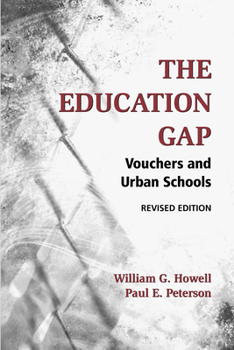The Education Gap: Vouchers and Urban Schools
Select Format
Select Condition 
Book Overview
The voucher debate has been both intense and ideologically polarizing, in good part because so little is known about how voucher programs operate in practice. In The Education Gap, William Howell and Paul Peterson report new findings drawn from the most comprehensive study on vouchers conducted to date. Added to the paperback edition of this groundbreaking volume are the authors' insights into the latest school choice developments in American education, including new voucher initiatives, charter school expansion, and public-school choice under No Child Left Behind. The authors review the significance of state and federal court decisions as well as recent scholarly debates over choice impacts on student performance. In addition, the authors present new findings on which parents choose private schools and the consequences the decision has for their children's education. Updated and expanded, The Education Gap remains an indispensable source of original research on school vouchers. ""This is the most important book ever written on the subject of vouchers.""--John E. Brandl, dean, Hubert H. Humphrey Institute of Public Affairs, University of Minnesota ""The Education Gap will provide an important intellectual battleground for the debate over vouchers for years to come.""--Alan B. Krueger, Princeton University ""Must reading for anyone interested in the battle over vouchers in America.""--John Witte, University of Wisconsin
Format:Paperback
Language:English
ISBN:0815736851
ISBN13:9780815736851
Release Date:February 2006
Publisher:Brookings Institution Press
Length:356 Pages
Weight:1.10 lbs.
Dimensions:0.9" x 6.1" x 9.0"
Customer Reviews
1 rating
Howell and Peterson are tops in their field
Published by Thriftbooks.com User , 21 years ago
Paul Peterson and William Howell are revolutionaries in their field--Education Public Policy. This book is so great because it lacks the ideological and political biases that permeate nearly 90 percent of the voucher books out there. Despite what the previous reviewer stated I wish to defend Howell and Peterson's book (which needs no defending from me). Their book which is put out by the Brookings Institute (hardly an ideologically driven think-tank Brookings is the model of centrism) Howell and Peterson formulate their empirical data from randomized field trials. RFTs are the gold standard in empirical research studies that seek to compare two groups of individuals while controlling for one factor. In this case Howell and Peterson are able to control for the much noted self-selection bias problematic to many voucher studies and show that African-American students from similar economic and educational backgrounds score significantly (1 standard deviation)higher when they are educated in parochial/private schools than in their neighborhood public schools. A wealth of research from 99.9 percent of all the other scholars studying this topic have in one shape or form supported that finding--that black students do improve upon going to a private school viz. a voucher. Only Alan Krueger and Zho (2004) of Princeton discredit parts of the study, but they refuse to control for baseline data which does not allow them to control the self-selection bias. Furthermore Krueger et al. uses a questionable racial classification scheme where self-identified black/hispanic folks are reclassified as African-American/non-hispanic. In the final analysis its hard to disagree with Peterson and Howell and the above reviewer does so at his own peril. These folks are professionals in the truest sense of the word and they work at the venerable Harvard Program on Education and Governance Policy--please don't try to mislead people into thinking they are overly ideologically motivated.





